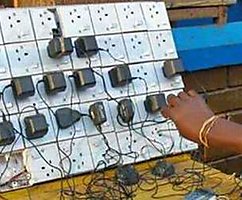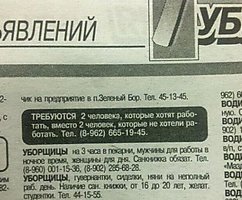"If You are paranoid, You lost your mind": how the Internet is watching us
 Bashny.Net
Bashny.Net
We waited a long time for the Internet will begin to help us live. And wait, says Walter Kern in the new issue of The Atlantic.
I knew we bought walnuts this week, and wanted to add them to porridge. I called the wife and asked where she put them. She was in the bathroom and not heard, so I found myself a bag and poured a little in a bowl. Lay on the table and charged my phone. I took it and opened the app that reads data from my bracelet (I wear it for a month, to monitor his physical condition). I saw that the previous night I slept for almost eight hours, and that I've fulfilled my daily goal of 13,000 steps — at 30%. And I noticed a message in a small window, showing various tips for a healthy lifestyle. "Walnuts", — said there. The app offered me walnuts.
Perhaps it was a coincidence. But I began to stare at his first bracelet, and then your phone. In the end, this is a new model with new features. Maybe he recognized my words and sent them in?
Our devices talk to each other behind our backs. But I started to wonder who else they talk to and about what? And then what happens to these conversations?

It was in the winter of 2013 and has since been repeated and repeated. One evening I met a friend in the art gallery in Hollywood. The next morning I received several spam messages with the offer to invest in art. It's easy: I entered the name of the picture in Google Maps. And one more thing: the flow of invitations from centers rehabilitation for alcohol addiction that occurred when I looked in the online calendar of meetings of alcoholics Anonymous.
Other things were harder to explain. For example, in the section "people you may know" on my page in Facebook one musician from California, I've encountered several times on AA meetings in a private home. He didn't tell me his name and didn't ask mine. Digging online, I found out that this could be due to the fact that he entered my number in the contacts list on your smartphone.
Around the same time I decided to change insurance company. I learned that the company Progressive offers discounts to drivers who are willing to put in the car tracking device Snapshot. I was shocked that people agreed with it. Time in the car I feel the sacred, this time, when I'm alone. To abandon this for the money seemed like heresy. I shared this thought with a friend. "What's the problem? he asked. — What's this doing in the car? It's like paranoia".
My friend was right in both respects. Yes, I do in the car, and Yes, I began to develop paranoia.
And I would be crazy if the paranoia I have not started.It happened when I saw a black helicopter.
In 1975, an old man, a Mormon told me that people will soon begin to wear the "chips", or they "will not allow the market."
One ex-soldier in the 1980s told me that "eye in the sky" can read my plate number.
A friend of mine in 1993 forbade me to rent a porn film, explaining that "it is".
One Hollywood actor in 2011, refused to go with me to the roof of his house, because he gained weight, and one security specialist has warned him that the paparazzi are using drones.
One graduate student a year before Snowden's revelations, told me about his friend who works in military intelligence and do not go to big parties, if you do not agree to leave their phones locked in the trunk or in the refrigerator, preferably with removed battery.
In January 2014 I vowed not to laugh at such people. I stood knee-deep in snow near the base of the national guard in Saratoga springs, near salt lake city. I was in a black jacket, a dark wool cap and a black nylon mask (to cheek is not frozen). I was doing counterintelligence. I wanted to see a newly built data center of the national security Agency. I didn't know what I'm looking for. But the NSA somewhere was supposed to keep records of phone calls, emails and Internet history-search ordinary Americans.
Many people reassure themselves of their own banality: we live boring lives, we have nothing to fear. But who knows how this surveillance will be useful to some future regime? What I think is simple — my purchase at Amazon or my movement around the city, captured on camera or through biometric scanners — when something can be perceived quite differently. Who knows what the charges would be more plausible with this data?
Information about the data center was classified. Aerial photography on the Internet showed a complex of concrete buildings in the form of a Crescent in the open field. It was said that the center consumes as much energy as a city with tens of thousands of residents. Its cooling system spent millions of litres of water a day. In the words of the cryptologist William Binnie, such a center can store information for decades.
With me in the snow was my friend Dalton brink, a former nuclear technician of the us Navy. We came from Montana and began to remember that shortly before the meeting exchanged a few emails, which could — at the expense of keywords is to attract the attention of the security services.
It is possible that we have already followed with GPS chips in our smartphones. We have heard that there are devices capable of erasing information on any phone in the area.And if we found especially suspicious, our phones could be remotely activated to listen to (the same tactic the FBI used in 2006).
These speculations seemed not so wild the next morning when it turned out that someone slashed the tire of our car. We put the spare on the road and fixed up the old. To Saratoga springs, we arrived in the evening when it was dark, and parked. Nearby was a car whose license plate ended with the letters NSA — NSA.
From the Parking place was visible to the road leading to the data center. The ghostly beauty of his gate looked more like an interstellar bridge than a military checkpoint. The perimeter was lit by green lights. We went forward. And soon I heard some popping sound. We turned around, but saw nothing. The aircraft looked some black mass, but had no distinct shape. The sign of his approach was only a blinking red light.
"I think he's studying us," said Dalton. I looked up and imagined on the screen the pilots look our body, green in infrared light. What else could they see?If they could look inside our phones, find out who we are, and to assess the level of threat we represent? It all seemed possible.
But then it was over. Shapeless object flew away, leaving us feeling that we played. We were there two jokers in the snow.
After another twenty minutes, stamping in the snow, we got closer than seemed possible. We didn't know already earned a data center. the place looked deserted. We looked over the fence at fifty yards and not seen and not heard nothing: no hum, no thump, nor any radiation. This place shocked me. Not for its size, and the idea that almost any human action or message in our such a complex world could ever be trapped in this complex of buildings the size of two shopping centre.
20 miles from Saratoga springs, in Utah, regularly collected the most suspicious people in America. It's called Rocky Mountain Gun Show. We Dalton have been there the next day. At the entrance to this gun show were two huge army truck with wheels as children's inflatable pools. Both were sold — that is, such products were buyers. Why? Carry the products in the ruined city? Block the airports? Storm the data centers?
At the exhibition, the salesman showed us the charges, which allows to pierce the human body dozens of tiny blades. At another stand we saw a coiled wire that was unfolding in the shot, slicing the target to pieces. This person also was selling backpacks with saws, briquette fuel, first-aid kits and other equipment that could be useful during the Apocalypse.
Importantly, he said the guy survive in the first few days after the ATMs will stop working, and the stores will be looted.When the sellers found out that we were from Montana, they asked if we saw there the camp where thousands of foreign soldiers are waiting for the imposition of martial law. The seller was worried that they "take away our women," and advised to listen to one podcast "Common sense" — that will prepare us to attack. He looked around, it's like I'm hiding a secret agents. Then I learned that the government planned to record the numbers of all the cars, standing nearby with arms fairs. The plan, however, was not realized in reality.
The exhibition has made me think not about weapons but about autonomy — the right to speak out against this arrogant new order whose instruments of control I watched last night. It seems that the rational response to this cybernetic PANOPTICON no or ignore him, or be crazy, at least to some extent. Data center as if calling out to someone launched something at him, like Goliath waiting for slingshot.
In the car, Dalton connected the phone and found the episode of "Common sense". It looks like its down in some bomb shelter. The guest of the program, a certain Professor Jim Garrow, allegedly a former spy who has spent the last thirty years, I worked "deep undercover" and learned about the different "chilling" plans to transform stadiums in camps where disobedient lovers of liberty will assemble, and then to behead with a guillotine. Why guillotine? Because they kill quickly and cleanly, and the body then will be useful to crazy with power elites, desirous of immortality.
The host and guest discussed all this slowly and as casually. Our restless time for them was only a prelude to the subsequent arrests and beheadings; perhaps this is to oppose, but obviously there is no reason to drink a sedative.
Before reaching Idaho, we stopped in Lava Hot springs- a town known for its thermal baths. I wanted to wash away the memory of the black helicopter. Sitting in a tub under the starry sky, I started a conversation with a guy who left school and imagined the future bleak prospects. He said that any job he can get, the better the robot performs, and this left a maximum of three years. I told him about my trip to the data center of the NSA, and he sighed and shook his head. Observation is meaningless, he said. The authorities should ask people to voluntarily share their secrets. He described the huge malls, where people can come, take the microphone and tell in detail about their experiences, thoughts and feelings. The wire allows you to catch only the crumbs of all this wealth.
To me it seemed a revelation. I thought — perhaps this new generation that the secret of private life seems archaic, willing to part with his inner world, his Holiness is no longer guaranteed. Why not just throw this fight? The surveillance system assumes that within us there is something, what you can get using the secret of observation; but what if we openly tell all about yourself? Perhaps the boom of social networks has such protection: what is given up for free, you can't steal.
But I'm too old for such exposure. I still believe in the boundaries of my skull and feel uncomfortable when they cross. Recently, when my wife went on a business trip, I wrote her a text message: "Sleep well, and may the fleas do not bite you". The next morning I received a letter from an exterminator, offering to clean my house from insects. If someone told me a few years ago, that's no coincidence, I would have questioned the sanity of this man. Today I question the wisdom of those who think differently. Paranoia seems to me to be no longer a disorder but rather a productive way of thinking. published
P. S. And remember, just changing your mind — together we change the world! © Join us at Facebook , Vkontakte, Odnoklassniki
Source: ideanomics.ru/?p=4907
I knew we bought walnuts this week, and wanted to add them to porridge. I called the wife and asked where she put them. She was in the bathroom and not heard, so I found myself a bag and poured a little in a bowl. Lay on the table and charged my phone. I took it and opened the app that reads data from my bracelet (I wear it for a month, to monitor his physical condition). I saw that the previous night I slept for almost eight hours, and that I've fulfilled my daily goal of 13,000 steps — at 30%. And I noticed a message in a small window, showing various tips for a healthy lifestyle. "Walnuts", — said there. The app offered me walnuts.
Perhaps it was a coincidence. But I began to stare at his first bracelet, and then your phone. In the end, this is a new model with new features. Maybe he recognized my words and sent them in?
Our devices talk to each other behind our backs. But I started to wonder who else they talk to and about what? And then what happens to these conversations?

It was in the winter of 2013 and has since been repeated and repeated. One evening I met a friend in the art gallery in Hollywood. The next morning I received several spam messages with the offer to invest in art. It's easy: I entered the name of the picture in Google Maps. And one more thing: the flow of invitations from centers rehabilitation for alcohol addiction that occurred when I looked in the online calendar of meetings of alcoholics Anonymous.
Other things were harder to explain. For example, in the section "people you may know" on my page in Facebook one musician from California, I've encountered several times on AA meetings in a private home. He didn't tell me his name and didn't ask mine. Digging online, I found out that this could be due to the fact that he entered my number in the contacts list on your smartphone.
Around the same time I decided to change insurance company. I learned that the company Progressive offers discounts to drivers who are willing to put in the car tracking device Snapshot. I was shocked that people agreed with it. Time in the car I feel the sacred, this time, when I'm alone. To abandon this for the money seemed like heresy. I shared this thought with a friend. "What's the problem? he asked. — What's this doing in the car? It's like paranoia".
My friend was right in both respects. Yes, I do in the car, and Yes, I began to develop paranoia.
And I would be crazy if the paranoia I have not started.It happened when I saw a black helicopter.
In 1975, an old man, a Mormon told me that people will soon begin to wear the "chips", or they "will not allow the market."
One ex-soldier in the 1980s told me that "eye in the sky" can read my plate number.
A friend of mine in 1993 forbade me to rent a porn film, explaining that "it is".
One Hollywood actor in 2011, refused to go with me to the roof of his house, because he gained weight, and one security specialist has warned him that the paparazzi are using drones.
One graduate student a year before Snowden's revelations, told me about his friend who works in military intelligence and do not go to big parties, if you do not agree to leave their phones locked in the trunk or in the refrigerator, preferably with removed battery.
In January 2014 I vowed not to laugh at such people. I stood knee-deep in snow near the base of the national guard in Saratoga springs, near salt lake city. I was in a black jacket, a dark wool cap and a black nylon mask (to cheek is not frozen). I was doing counterintelligence. I wanted to see a newly built data center of the national security Agency. I didn't know what I'm looking for. But the NSA somewhere was supposed to keep records of phone calls, emails and Internet history-search ordinary Americans.
Many people reassure themselves of their own banality: we live boring lives, we have nothing to fear. But who knows how this surveillance will be useful to some future regime? What I think is simple — my purchase at Amazon or my movement around the city, captured on camera or through biometric scanners — when something can be perceived quite differently. Who knows what the charges would be more plausible with this data?
Information about the data center was classified. Aerial photography on the Internet showed a complex of concrete buildings in the form of a Crescent in the open field. It was said that the center consumes as much energy as a city with tens of thousands of residents. Its cooling system spent millions of litres of water a day. In the words of the cryptologist William Binnie, such a center can store information for decades.
With me in the snow was my friend Dalton brink, a former nuclear technician of the us Navy. We came from Montana and began to remember that shortly before the meeting exchanged a few emails, which could — at the expense of keywords is to attract the attention of the security services.
It is possible that we have already followed with GPS chips in our smartphones. We have heard that there are devices capable of erasing information on any phone in the area.And if we found especially suspicious, our phones could be remotely activated to listen to (the same tactic the FBI used in 2006).
These speculations seemed not so wild the next morning when it turned out that someone slashed the tire of our car. We put the spare on the road and fixed up the old. To Saratoga springs, we arrived in the evening when it was dark, and parked. Nearby was a car whose license plate ended with the letters NSA — NSA.
From the Parking place was visible to the road leading to the data center. The ghostly beauty of his gate looked more like an interstellar bridge than a military checkpoint. The perimeter was lit by green lights. We went forward. And soon I heard some popping sound. We turned around, but saw nothing. The aircraft looked some black mass, but had no distinct shape. The sign of his approach was only a blinking red light.
"I think he's studying us," said Dalton. I looked up and imagined on the screen the pilots look our body, green in infrared light. What else could they see?If they could look inside our phones, find out who we are, and to assess the level of threat we represent? It all seemed possible.
But then it was over. Shapeless object flew away, leaving us feeling that we played. We were there two jokers in the snow.
After another twenty minutes, stamping in the snow, we got closer than seemed possible. We didn't know already earned a data center. the place looked deserted. We looked over the fence at fifty yards and not seen and not heard nothing: no hum, no thump, nor any radiation. This place shocked me. Not for its size, and the idea that almost any human action or message in our such a complex world could ever be trapped in this complex of buildings the size of two shopping centre.
20 miles from Saratoga springs, in Utah, regularly collected the most suspicious people in America. It's called Rocky Mountain Gun Show. We Dalton have been there the next day. At the entrance to this gun show were two huge army truck with wheels as children's inflatable pools. Both were sold — that is, such products were buyers. Why? Carry the products in the ruined city? Block the airports? Storm the data centers?
At the exhibition, the salesman showed us the charges, which allows to pierce the human body dozens of tiny blades. At another stand we saw a coiled wire that was unfolding in the shot, slicing the target to pieces. This person also was selling backpacks with saws, briquette fuel, first-aid kits and other equipment that could be useful during the Apocalypse.
Importantly, he said the guy survive in the first few days after the ATMs will stop working, and the stores will be looted.When the sellers found out that we were from Montana, they asked if we saw there the camp where thousands of foreign soldiers are waiting for the imposition of martial law. The seller was worried that they "take away our women," and advised to listen to one podcast "Common sense" — that will prepare us to attack. He looked around, it's like I'm hiding a secret agents. Then I learned that the government planned to record the numbers of all the cars, standing nearby with arms fairs. The plan, however, was not realized in reality.
The exhibition has made me think not about weapons but about autonomy — the right to speak out against this arrogant new order whose instruments of control I watched last night. It seems that the rational response to this cybernetic PANOPTICON no or ignore him, or be crazy, at least to some extent. Data center as if calling out to someone launched something at him, like Goliath waiting for slingshot.
In the car, Dalton connected the phone and found the episode of "Common sense". It looks like its down in some bomb shelter. The guest of the program, a certain Professor Jim Garrow, allegedly a former spy who has spent the last thirty years, I worked "deep undercover" and learned about the different "chilling" plans to transform stadiums in camps where disobedient lovers of liberty will assemble, and then to behead with a guillotine. Why guillotine? Because they kill quickly and cleanly, and the body then will be useful to crazy with power elites, desirous of immortality.
The host and guest discussed all this slowly and as casually. Our restless time for them was only a prelude to the subsequent arrests and beheadings; perhaps this is to oppose, but obviously there is no reason to drink a sedative.
Before reaching Idaho, we stopped in Lava Hot springs- a town known for its thermal baths. I wanted to wash away the memory of the black helicopter. Sitting in a tub under the starry sky, I started a conversation with a guy who left school and imagined the future bleak prospects. He said that any job he can get, the better the robot performs, and this left a maximum of three years. I told him about my trip to the data center of the NSA, and he sighed and shook his head. Observation is meaningless, he said. The authorities should ask people to voluntarily share their secrets. He described the huge malls, where people can come, take the microphone and tell in detail about their experiences, thoughts and feelings. The wire allows you to catch only the crumbs of all this wealth.
To me it seemed a revelation. I thought — perhaps this new generation that the secret of private life seems archaic, willing to part with his inner world, his Holiness is no longer guaranteed. Why not just throw this fight? The surveillance system assumes that within us there is something, what you can get using the secret of observation; but what if we openly tell all about yourself? Perhaps the boom of social networks has such protection: what is given up for free, you can't steal.
But I'm too old for such exposure. I still believe in the boundaries of my skull and feel uncomfortable when they cross. Recently, when my wife went on a business trip, I wrote her a text message: "Sleep well, and may the fleas do not bite you". The next morning I received a letter from an exterminator, offering to clean my house from insects. If someone told me a few years ago, that's no coincidence, I would have questioned the sanity of this man. Today I question the wisdom of those who think differently. Paranoia seems to me to be no longer a disorder but rather a productive way of thinking. published
P. S. And remember, just changing your mind — together we change the world! © Join us at Facebook , Vkontakte, Odnoklassniki
Source: ideanomics.ru/?p=4907
Tags
See also
Nature has gone mad
Cat Fight
Bunk bed in the nursery 2.
TOP-15 most cited cartoons
Wisdom and humor from the Internet.
Nine ways to reduce the crazy owner
Psychotherapist Michael Litvak, "People are born geniuses, and in the upbringing of them make fools"
Michael Litvak: we women are raised in the style of latent prostitution
Dani Shapiro: 7 types of people you will sooner or later have to leave
















